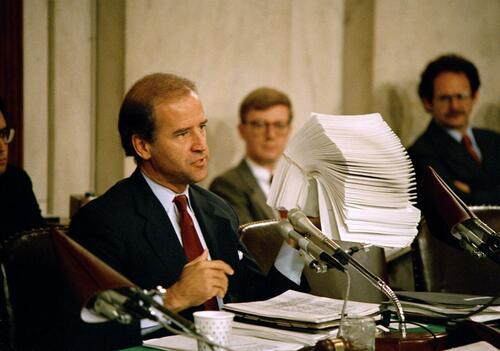University Of Delaware Continues Fight To Shield Biden Documents From Public Review
After a setback before the Delaware Supreme Court, the University of Delaware is continuing its dogged effort to prevent the public from seeing the senatorial papers of President Joe Biden. The continued litigation, at public cost, has been criticized as an effort to shield President Biden from potentially embarrassing material from being accessed by the media or public interest groups.
For a research institution, it is a curious role to prevent access to documents but clearly a role supported by President Biden and his family.
What is particularly troubling is the reason being claimed by the university.
We have previously discussed these documents and their potential significance to inquiries ranging from sexual harassment complaints to foreign dealings. The university insists that, so long as it does not use public funds for the maintenance of the Biden documents, it is immune from the Freedom of Information Act. By using private funds, it is arguing that it can keep the material locked away from public review.
A Superior Court decision held that the papers were not subject to FOIA based on dismissive and clearly inadequate filings by the university. The Delaware Supreme Court has now sent the matter back to the lower court for additional review. It has held that the university must still show that it is immune from public disclosure laws and must potentially conduct searches of its records requested by Judicial Watch and the Daily Caller News Foundation.
The Supreme Court specifically found the earlier representations of Jennifer M. Becnel-Guzzo, Esq., University FOIA Coordinator to be insufficient to carry the burden under the law. It also noted that it was not made under oath. Accordingly, Delaware Superior Court Judge Mary Johnston ordered the university to submit evidence that archives Biden gave the school in 2012 are not subject to a public records request and consequently public access.
Delaware’s Freedom of Information Act states that “’Public body,’ ‘public record’ and ‘meeting’ shall not include activities of the University of Delaware and Delaware State University, except that the Board of Trustees of both universities shall be ‘public bodies,’ university documents relating to the expenditure of public funds shall be “public records.”
A review of Becnel-Guzzo statement shows why the Supreme Court was concerned about the lower court just accepting the vague statement on its face. It included such representations as:
In recent years, I have responded to numerous FOIA requests having to do with the University’s relationship to Joseph R. Biden, Jr. Thus, on several occasions I have inquired of University personnel, including the University’s budget office and the University’s library, whether State funds have been spent on a variety of matters or undertakings related to Mr. Biden. In no case have I found that State funds were spent by the University on any such matter or undertaking…
Finally, I inquired whether state funds have been spent on the University’s email system over which email communications between University personnel and any representative of Mr. Biden might have been exchanged. They were not.
That seems fairly remarkable. Not a single archivist or staffer supported by state funds has ever worked on these papers? That makes the University of Delaware sound like little more than a secure location to lock away documents.
Likewise, the university email system is not supported by state funds? It is hard to believe that no emails were sent to the Biden family or staff on the matter, but it is not clear whether the university is claiming that its email system is entirely independent of any staffer or resource supported by state funds.
The Supreme Court ruling stated:
“Unless it is clear on the face of the request that the demanded records are not subject to FOIA, the public body must search for responsive records. A description of the search and the outcome of the search must be reflected through statements made under oath, such as statements in an affidavit, in order for the public body to satisfy its burden of proof…On remand, the University bears the burden to create a record from which the Superior Court can determine whether the University performed an adequate search for responsive documents.”
President Biden has pushed against efforts for the review of his papers from his time as a U.S. senator, including transparently narrow searches of material that specifically excluded what he packed off to the University of Delaware. The question is why. There is also a question of whether it is appropriate for the University of Delaware to be used for such a purpose. It is not clear when such documents would be made available for public review under these conditions.
The University has this posting on the archived records:
President Biden donated his Senatorial papers to the University of Delaware pursuant to an agreement that prohibits the University from providing public access to those papers until they have been properly processed and archived. The University is bound by, and will comply with, the agreement. Until the archival process is complete and the collection is opened to the public, access is only available with President Biden’s express consent.
President Biden and his designees have access, under supervision of Special Collections, to the materials during the process. No Biden designee has visited the collection since November, 2019. No documents have been added or removed by any Biden designees during any visits.
The University states that “More than 1,850 boxes of archival records from the President’s Senate career arrived at the Library on June 6, 2012.” It has been ten years.
It would seem that a decade would be sufficient to “properly process[] and archive[]” these boxes of documents.
The impression is that the university is being used — and is actively maintaining its function — as a lock box to block researchers, public interest groups, and the public at large from gaining access to the material.
Tyler Durden
Tue, 07/12/2022 – 11:20

